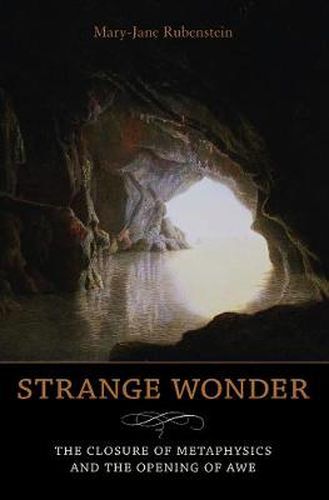Readings Newsletter
Become a Readings Member to make your shopping experience even easier.
Sign in or sign up for free!
You’re not far away from qualifying for FREE standard shipping within Australia
You’ve qualified for FREE standard shipping within Australia
The cart is loading…






Strange Wonder confronts Western philosophy’s ambivalent relationship to the Platonic wonder that reveals the strangeness of the everyday. On the one hand, this wonder is said to be the origin of all philosophy. On the other hand, it is associated with a kind of ignorance that ought to be extinguished as swiftly as possible. By endeavoring to resolve wonder’s indeterminacy into certainty and calculability, philosophy paradoxically secures itself at the expense of its own condition of possibility. Strange Wonder locates a reopening of wonder’s primordial uncertainty in the work of Martin Heidegger, for whom wonder is first experienced as the shock at the groundlessness of things and then as an astonishment that things nevertheless are. Mary-Jane Rubenstein traces this double movement through the thought of Emmanuel Levinas, Jean-Luc Nancy, and Jacques Derrida, ultimately thematizing wonder as the awesome, awful opening that exposes thinking to devastation as well as transformation. Rubenstein’s study shows that wonder reveals the extraordinary in and through the ordinary, and is therefore crucial to the task of reimagining political, religious, and ethical terrain.
$9.00 standard shipping within Australia
FREE standard shipping within Australia for orders over $100.00
Express & International shipping calculated at checkout
Strange Wonder confronts Western philosophy’s ambivalent relationship to the Platonic wonder that reveals the strangeness of the everyday. On the one hand, this wonder is said to be the origin of all philosophy. On the other hand, it is associated with a kind of ignorance that ought to be extinguished as swiftly as possible. By endeavoring to resolve wonder’s indeterminacy into certainty and calculability, philosophy paradoxically secures itself at the expense of its own condition of possibility. Strange Wonder locates a reopening of wonder’s primordial uncertainty in the work of Martin Heidegger, for whom wonder is first experienced as the shock at the groundlessness of things and then as an astonishment that things nevertheless are. Mary-Jane Rubenstein traces this double movement through the thought of Emmanuel Levinas, Jean-Luc Nancy, and Jacques Derrida, ultimately thematizing wonder as the awesome, awful opening that exposes thinking to devastation as well as transformation. Rubenstein’s study shows that wonder reveals the extraordinary in and through the ordinary, and is therefore crucial to the task of reimagining political, religious, and ethical terrain.